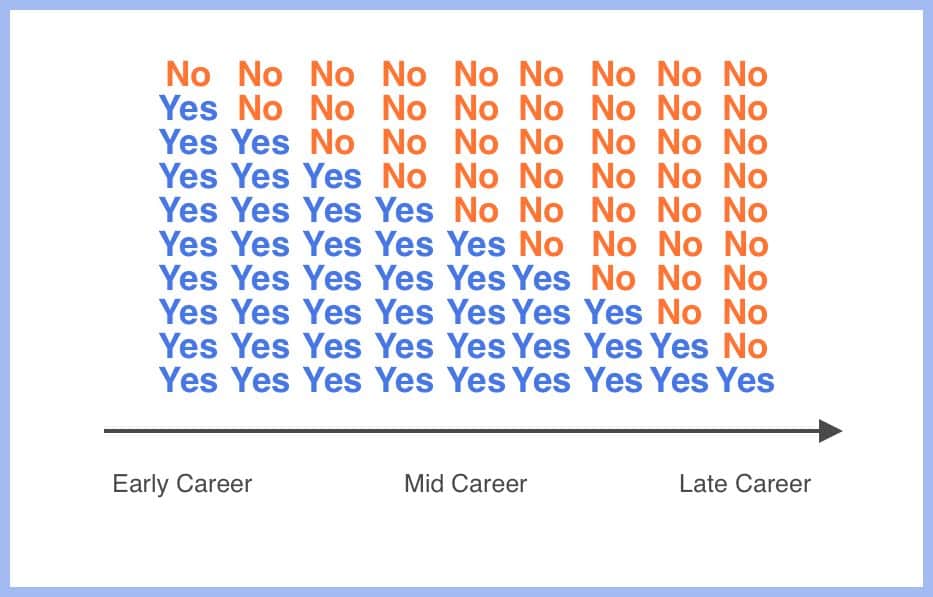Delfina Hoxha is an Albanian writer of the 3 C-s: content, copy, creative. A writing career is considered a novelty where she lives, so she’s frequently met with confusion after explaining she doesn’t write novels or poems but is a full-time writer.
Delfina is the Head Writer for an umbrella group of companies that have offered communication solutions to millions of Albanians for the past 21 years. She creates most of their long-form written pieces covering education, tech, careers, strategy, business.
Delfina also runs her own freelance writing company, The Inner Dolphin, where she combines her storytelling expertise with her psychology background to create killer copy for clients. She publishes a new piece on her blog with the same name every Sunday.
Delfina is an outspoken advocate for human rights and recently created a petition asking for a public registry of sexual offenders, which was shared and signed thousands of times. The initiative was covered and supported by local media and organizations and recently proposed to the Parliament.
She also assists the National Alliance of Mental Illness SFV with newsletter creation, various email campaigns, web copy, and articles.
How Did You Become a Writer?
My first-grade teacher didn’t appreciate my northern accent and the written errors it caused, which slowed down the process a bit. When I finally learned how to write, though, it was the beginning of a lifelong romance, and we’ve been inseparable ever since.
Elizabeth Gilbert, the author of Eat Pray Love, knew she wanted to be a writer since she was a child. However, she had decided she’d never burden her passion with having to take care of her financially – and she didn’t, until her fourth successful book.
I wanted to be a writer since I was a kid, too, but for years, I was scared. When we focus on getting the dream job or building the perfect career, thinking gets debilitating, choice paralysis controlling. Focus on the next right step. Having an action bias is what turned me into a full-time writer. Just doing, doing, doing.
How Did You Get Your First Writing Job?
Writing is still as wildly fascinating and important to me as it was to my first-grade self. It’s still the most out-of-this-world thing, but now I love it openly, actively. After I completed my BA in Psychology, I went to Sri Lanka to volunteer as a mental health aide. During my time there, I realized, filled with fear but mostly joy, that I wanted to give writing a serious try.
Our lifelong romance is now a healthy, happy, committed relationship.
When I came back home, I started devoting my time to finding freelance writing work. I got $15 for my first gig, and I was ecstatic!
After I built up my professional confidence, I got a content job at a high-growth startup with multiple learning opportunities.
Pro tip: try to include writing in your daily job tasks. I started writing long-form articles, email, web copy, ad, and social media copywriting, doing interviews, and opened a Medium account for the startup.
Then, I came across a job listing looking for a Writer, capital W and all. The job involved a pay cut. I had to choose between my short-term and long-term goals. Considering the median wage in Albania is $350 per month, I chose the latter, it wouldn’t matter in the long run and my dream was closer than ever. Experience and time are often more valuable assets than money.
What Skills Do You Need to Be a Good Writer?
First and foremost, a good writer needs to be empathetic. Readers’ time and attention are more limited than ever, and whether we’re writing ad copy or a sci-fi novel, we should never take those assets for granted.
Writers, hone your storytelling skills. Earlier this month, I met up with a friend, and we got to talking about writing. As someone who writes for a living, that doesn’t happen to me as often as you would think it would.
I can’t remember what the question was verbatim, something like: “What makes a writer?”
My answer: “You write when you have a story to tell.”
In a lot of cases, though, a good story isn’t enough and doesn’t imply beautiful storytelling. Brands are willing to pay a shit ton of money for good storytelling. Also, to be able to tell a story (or recognize one), you need to master the art of active listening.
You need to be a good researcher and have the ability to combine unusual associations (The Medici Effect). While you don’t need marketing knowledge to be a good writer, you need it to be a successful writer.
If the thought of sales or ads makes you cringe, I highly recommend this free Marketing Worksheet by Alexandra Franzen.
What Influences Your Writing the Most?
When I’m writing for my audience, daily occurrences and the beauty of the seemingly mundane influence and inspire me. I have a tattoo that says “MAKE MAGIC DO GOOD” and I try to find that magic in the smallest gestures and moments.
Just trying is usually enough – when we actively train our brains to look for positives, it’s easier to spot them and be incited by them. David Cain and Derek Sivers may be my all-time favorite contemporary writers, and I’m sure they’ve influenced my writing way more than I realize.
When I’m writing for clients, I try to combine: an issue the company is trying to solve + an impressive piece I read lately + patterns I’ve been noticing (in the industry or daily conversations), and see how I can beautifully tie them all together.
However, Cal Newport put it beautifully in Deep Work: Rules for Focused Success in a Distracted World:
There is a popular notion that artists work from inspiration—that there is some strike or bolt or bubbling up of creative mojo from who knows where… but I hope [my work] makes clear that waiting for inspiration to strike is a terrible, terrible plan.
In fact, perhaps the single best piece of advice I can offer to anyone trying to do creative work is to ignore inspiration.
What Tools and Software Do You Use for Work?
Evernote for writing, ZenPen for a minimal writing space, Google Docs and Airtable for sharing and receiving feedback, Yoast SEO plugin and Ubersuggest for optimization, Grammarly for spell checking and grammar errors, Sharethrough Headline Analyzer for titles, Copyscape for plagiarism.
I haven’t had the chance to try the Hemingway App, but I’ve heard great things about it also. I enjoy writing directly on my CMS as well (WordPress). Visual editor, but not full-screen mode, God no.
Software can be unreliable, so no matter how much you love your Evernote (I know I do), save your pieces offline! If you’ve ever written for a site where you don’t have editing access, download the article as a Word document. A journalist on Twitter sharing her horror stories about losing work because of dead sites and bankrupt businesses inspired me (well, scared me), and I saved 60+ pieces I’d written for others on my PC.
As much as I love software practicality, nothing beats pen and paper for coming up with ideas or focusing on what’s important in a project. Another unorthodox tool is mindfulness meditation, I get most of my article ideas when I meditate, so I’d highly recommend it. There are even meditations specifically for creatives nowadays.
What Are Your Writing Habits?
There is nothing to writing. All you do is sit at a typewriter and blink.
Move over, Hemingway, there’s a new quote in town, uniting procrastination, writer’s block, and burnout. While these three factors are undeniably important, I’ve been able to streamline my writing schedule to make it work for me, not vice-versa.
As that excerpt from Cal Newport stated, I don’t rely on inspiration or bursts of productivity to GSD. I sit down at 8:30 AM, Monday to Friday, and then I write, but I also work weekends and nights when it’s necessary. While there are plenty of exceptional time management techniques, I believe the problem runs deeper, and procrastination is a different issue altogether.
I avoid writer’s block with the help of Newton’s First Law and by having a solid list of article ideas and themes I want to cover. Also, for the past year or so, I’ve been indulging myself, resting when I need to. Listening to my body has proven to be a great way to avoid burnout.
What’s the Best Investment You Made in Your Career?
One of the most transformative learning experiences for me was obtaining my psychology degree. It was one of the best investments, personally and professionally. What’s more fascinating than human behavior, our minds, and inner worlds?
My psychology degree taught me a lot about human behavior:
- persuasion
- why people do the things they do
- the way our past actively affects our daily interactions
- how predictable (not necessarily in a bad way) a lot of people are.
It taught me how to be assertive, to communicate clearly, to set boundaries, and to know my worth.

Delfina Hoxha. Photo supplied by the writer.
Ian Lurie’s LinkedIn Learning Copywriting course was also a great investment. It showed me what great copywriting is. Listening to Myleik Teele’s podcast jump-started my career and massively improved my attitude around work.
What Are the Most Influential Books in Your Life?
“Words are, in my not-so-humble opinion, our most inexhaustible source of magic.” I share the sentiment, as a full-time writer and an all-time book lover.
Growing up in Albania, a slowly developing country where a lot of resources weren’t readily available, I’ve felt firsthand the undeniable importance of learning.
I would be a different person completely if it weren’t for the books, podcasts, videos, talks, conversations I observed from another continent, from, what felt at times like, a different world. I’d be someone else if it weren’t for the books my parents read and the learning path they decided to pursue.
For Writers
- If you’re scared: Big Magic: Creative Living Beyond Fear by Elizabeth Gilbert
- If you’re ready for some tough love: On Writing: A Memoir of the Craft by Stephen King
- If you’re not sure where to start: Bird by Bird: Some Instructions on Writing and Life by Anne Lamott
- If you’re struggling with writer’s block: The War of Art: Break Through the Blocks and Win Your Inner Creative Battles by Steven Pressfield
- If you’re ready for an emotionally draining, creatively empowering journey: The Artist’s Way: A Spiritual Path to Higher Creativity by Julia Cameron
For Everyone
- Tiny Beautiful Things by Cheryl Strayed
- The Night in Lisbon by Erich Maria Remarque
- One Hundred Years of Solitude by Gabriel Garcia Marquez
- Zahir by Paulo Coehlo
- Love by Leo Buscaglia
- The Defining Decade: Why Your Twenties Matter–And How to Make the Most of Them Now by Meg Jay
- You Are a Badass by Jen Sincero
- Small Great Things by Jodi Picoult
- Company of One by Paul Jarvis
What Are Your Favorite Writing Quotes?
“Work like the client is you in two years.” This quote/mindset is always pushing me forward. “If you mind your manners, just as you would at a casual dinner or a first date, you’ll be just fine.” – Ian Lurie referring to copywriting. No gimmicks, no empty promises, no clickbait, just minding our manners, and making love to words.“We die. That may be the meaning of life. But we do language. That may be the measure of our lives.” – Toni Morrison
“In the early days of my business, I spent a LOT of time fiddling about with “contests” and “scholarships” and “discounts” and “free consultations” and “special offers” and all kinds of riff-raff, in a desperate effort to get booked.
God only knows how many anxious hours I spent, fretting about how to woo clients into my world. (“Why won’t they just hiiiire me already?”)
Looking back, all I can say is this: Instead of fretting and doing weird marketing-ish gimmicks, I sure wish I had spent all of those hours serving people… creating art… and actually making an effort to become better at my work.
If I had done that, I suspect that my first couple of years of self-employed-ness would have been a lot smoother, a lot more rewarding, and a lot more profitable.” – The simple, sexy truth about how to “get booked” and “sell stuff.” by Alexandra Franzen
A lot of new writers obsess over everything there is, besides improving their writing. I keep in mind this quote by Alex whenever I feel like I’m not moving as fast as I’d like, besides “Direction’s more important than speed.”
If Someone Wants to Be Where You Are Now, How Can They Get There?
The only way to change a situation and take charge of it is by taking action. Nothing changes if nothing changes.
“All the really successful people I know have a very strong action bias. They just do things. The easiest way to figure out if something is viable or not is by doing it… So, if you want to be successful in life, creating wealth, or having good relationships, or being fit, or even being happy, you need to have an action bias towards getting what you want.”
With that action bias and an open mind, letting curiosity guide you, is the way I’d recommend to proceed to become a writer.

Say “Yes” to Start Your Career, Say “No” to Advance It on Superpath.
You can read and absorb all the advice in the world, and it still won’t be as valuable as acting on your desire by doing.
Go the extra mile. Write a lot, pitch a lot, try a lot, say “Yes” a lot.
